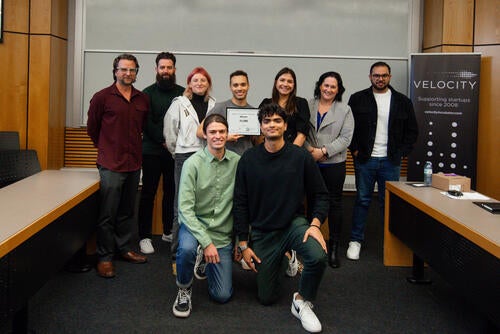
Students innovate, seniors thrive
AgeTech Innovation Challenge sees Waterloo students build tech solutions for aging population

AgeTech Innovation Challenge sees Waterloo students build tech solutions for aging population
By Media RelationsIt turns out young adults do have some wisdom to share with older generations.
Students from across the University of Waterloo recently wrapped up Velocity’s AgeTech Innovation Challenge, a 10-day-long event conducted in collaboration with the Centre for Aging + Brain Health Innovation (CABHI).
70 students in 16 teams showcased their solutions to support aging populations by enhancing older adults’ health and wellness, empowering caregivers, and bolstering the healthcare system.
Tina Wilton, Velocity’s Entrepreneurship Experience Manager, said student-led innovation plays a crucial role in addressing the world’s most significant problems.
“These innovation challenges serve as a springboard for students, introducing them to entrepreneurship and inspiring them to tackle important problems and realize their potential to develop lasting, innovative solutions that can significantly improve the quality of life for the world’s aging population,” said Wilton.
She said with guidance from CABHI’s mentors and Senior Advisory Panel, students had the opportunity to create meaningful change.
“Our hope is that students continue to address important problems that resonate with them, creating a brighter future for all,” added Wilton.
Dr. Allison Sekuler, president and chief scientist at CABHI, said the organization was extremely inspired by the innovative spirit and fresh perspectives of the Waterloo students who took part in the challenge.
“They are not just dreaming of a better future for aging, they’re building it,” said Dr. Sekuler. “CABHI is proud to partner with and support these young visionaries working toward our common goal of all older persons living lives of dignity, purpose, and fulfillment.”
Beyond working in groups to conceive and build important age-tech solutions, teams were also vying for a share of a $15,000 grand prize, a senior’s choice prize presented by CABHI’s Senior Advisory Panel, and a people’s choice award for special recognition.
Three teams split the $15,000 grand prize: PlantPal, a system designed to detect early dementia; VeinGuard, a wearable armsleeve monitor to detect blood clot formation; and ADAPT, a robot to aid with physiotherapy.

Members of the PlantPal team pose alongside AgeTech judges. Rear (L to R) Dylan Horvath, Ryan Webster, Mykhailo Brizkalo, Moazam Khan, Rachel Bartholomew. Front (L to R) Omkaar Kamath, Omar Atwa.
Companion, an AI-powered holographic tool for realistic remote conversations, won CABHI’s senior advisory panel award, while Encephalon, which uses virtual reality to help slow the progression of Alzheimer's disease, won the people’s choice award.
PlantPal team member Mykhailo Brizkalo, a Waterloo computer science graduate student, said the group pivoted from an early prototype that would use voice recognition to alert users when a plant needs watering to address a problem highlighted by the AgeTech challenge.
“We had this device that could ask and process answers, but we thought, ‘How can we use all this data wisely to help seniors?’” Brizkalo said. “With dementia being such a big problem and early detection being so important, that’s how we knew our solution had potential.”
About Velocity
Velocity accelerates entrepreneurs' growth from idea to early-stage start-up, and beyond. These founders have access to unmatched resources, collaboration space, funding, and an expansive and experienced network made possible only by the University of Waterloo — Canada's top university for founders. In the 15 years since its inception as a University of Waterloo residence, more than 400 Velocity companies have netted more than US$26 billion in enterprise value.

Read more
Here are the people and events behind some of this year’s most compelling Waterloo stories

Read more
The 2025 cohort represents some of the brightest new entrepreneurial minds in STEM

Read more
GreenHouse awards $10,000 to student ventures and changemakers aiming to transform livelihoods within disadvantaged communities
The University of Waterloo acknowledges that much of our work takes place on the traditional territory of the Neutral, Anishinaabeg, and Haudenosaunee peoples. Our main campus is situated on the Haldimand Tract, the land granted to the Six Nations that includes six miles on each side of the Grand River. Our active work toward reconciliation takes place across our campuses through research, learning, teaching, and community building, and is co-ordinated within the Office of Indigenous Relations.